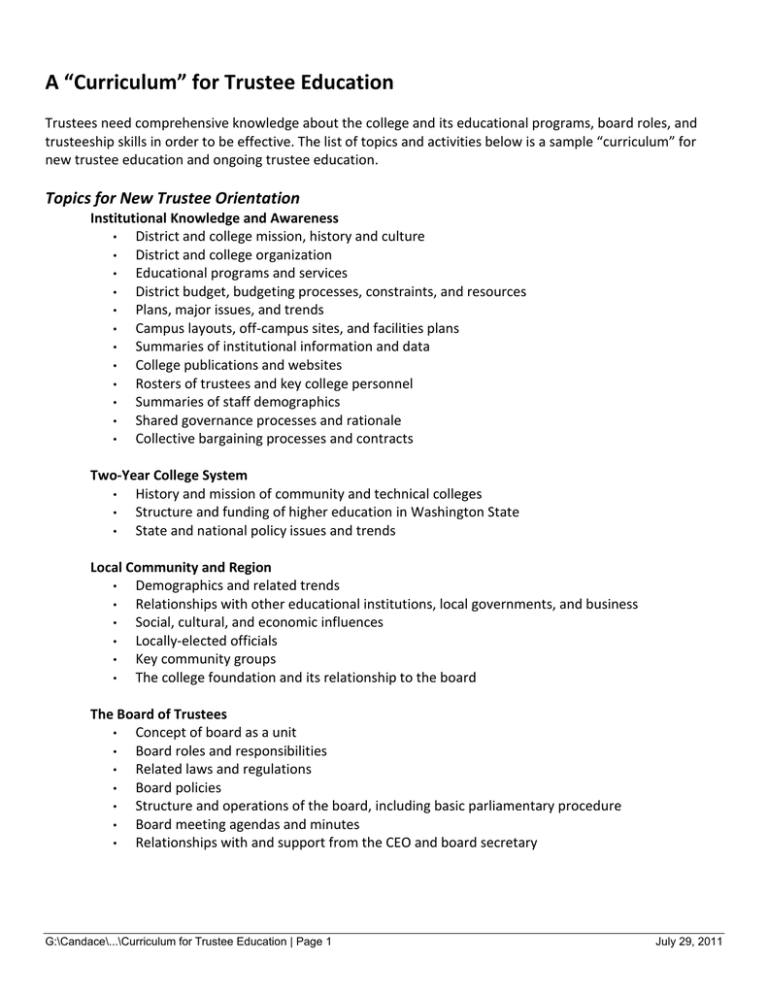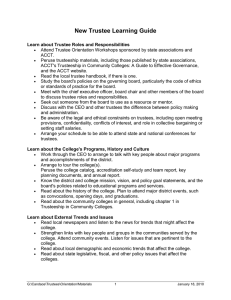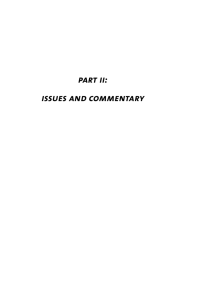A “Curriculum” for Trustee Education
advertisement

A “Curriculum” for Trustee Education Trustees need comprehensive knowledge about the college and its educational programs, board roles, and trusteeship skills in order to be effective. The list of topics and activities below is a sample “curriculum” for new trustee education and ongoing trustee education. Topics for New Trustee Orientation Institutional Knowledge and Awareness • District and college mission, history and culture • District and college organization • Educational programs and services • District budget, budgeting processes, constraints, and resources • Plans, major issues, and trends • Campus layouts, off-campus sites, and facilities plans • Summaries of institutional information and data • College publications and websites • Rosters of trustees and key college personnel • Summaries of staff demographics • Shared governance processes and rationale • Collective bargaining processes and contracts Two-Year College System • History and mission of community and technical colleges • Structure and funding of higher education in Washington State • State and national policy issues and trends Local Community and Region • Demographics and related trends • Relationships with other educational institutions, local governments, and business • Social, cultural, and economic influences • Locally-elected officials • Key community groups • The college foundation and its relationship to the board The Board of Trustees • Concept of board as a unit • Board roles and responsibilities • Related laws and regulations • Board policies • Structure and operations of the board, including basic parliamentary procedure • Board meeting agendas and minutes • Relationships with and support from the CEO and board secretary G:\Candace\...\Curriculum for Trustee Education | Page 1 July 29, 2011 Trusteeship • Code of ethics or standards of practices; conflicts of interest • Communication protocols with staff and the community • Working as a team; collaboration; influence • Trustee perquisites and constraints • Education and training opportunities • Conferences, seminars, and workshops • Recommended reading and other informational resources What New Trustees Say Was Most Important to Learn . . . • Their policy-making role • Fiscal issues and budgets • Legal conditions • The role of community and technical colleges • How to listen and stay objective • How to work as a unit • How to build trust and teamwork with the board and CEO • How to influence board decisions • How to monitor without micromanaging • How to engage in “shared governance” • How to link with and represent the external community Topics for Ongoing Education Governing Boards and Trusteeship • Approaches to effective board governance • Board policy review and development • Community links and representation • Board self-evaluation processes and criteria • Setting and achieving board goals • Collaboration, teamwork, and conflict management • Effective meetings and agenda construction • Ethics and standards of practice Educational Policy Trends and Issues • Collaboration and partnerships • Competition in higher education • State and national legislative and public policy proposals • Accountability and institutional effectiveness • Community, regional, state, and global trends and issues • Technology • Distance learning and other alternatives to traditional delivery • Faculty, staff, and student roles and trends • Laws and regulatory changes G:\Candace\...\Curriculum for Trustee Education | Page 2 July 29, 2011 Institutional Programs, Trends and Issues • Collaboration with the community, business, and industry • Governance practices, including shared governance • Strategic and long-range planning • Educational programs and services • Institutional effectiveness and program review • Accreditation • Fiscal projections and conditions • Facilities needs and planning • Employee contracts and negotiation process A trustee education “curriculum” should be designed to meet individual learning styles and needs. The outcome of the curriculum is that the governing board is effective and consists of individual trustees who bring comprehensive knowledge and skills to their policy-making responsibilities. G:\Candace\...\Curriculum for Trustee Education | Page 3 July 29, 2011




